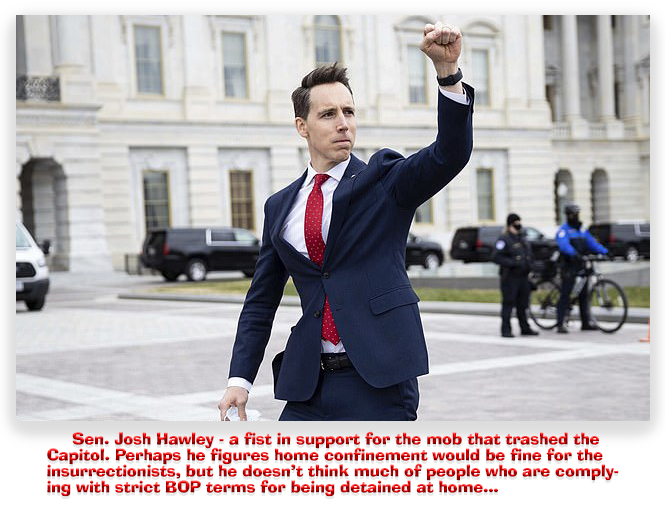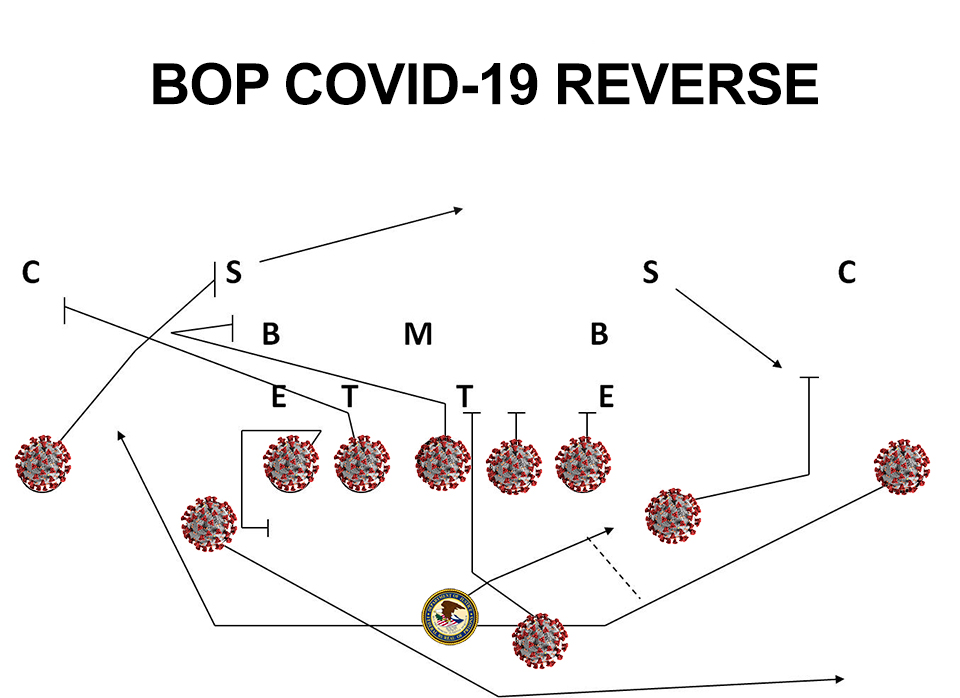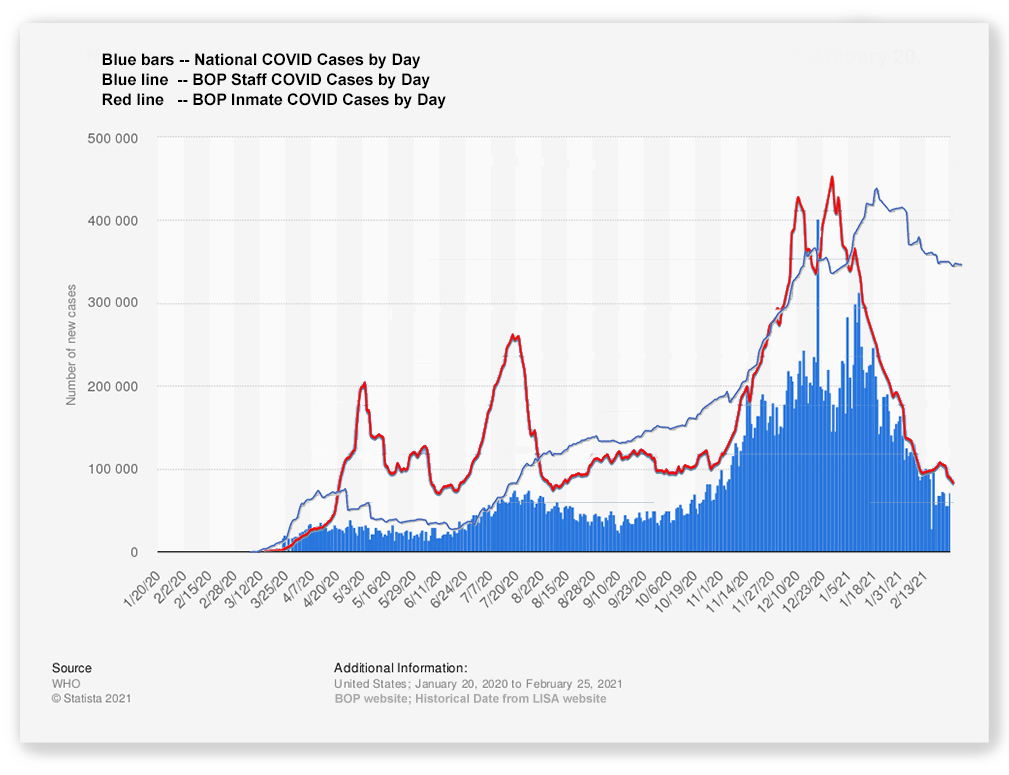We post news and comment on federal criminal justice issues, focused primarily on trial and post-conviction matters, legislative initiatives, and sentencing issues.

SOME BOP HONCHOS GET EARLY RELEASE, AND CARVAJAL MAY BE NEXT
 The Associated Press reported last Wednesday that two Federal Bureau of Prisons Regional Directors have been relieved of their posts. Senior Biden administration officials are also considering replacing Director Michael Carvajal, whom the AP describes as being “at the center” of the “beleaguered agency’s myriad crises.”
The Associated Press reported last Wednesday that two Federal Bureau of Prisons Regional Directors have been relieved of their posts. Senior Biden administration officials are also considering replacing Director Michael Carvajal, whom the AP describes as being “at the center” of the “beleaguered agency’s myriad crises.”
The discussions about whether to fire Carvajal are in the preliminary stages and a final decision hasn’t yet been made, AP said it had been told by two people familiar with the matter. They were not authorized to publicly discuss the internal talks and spoke on condition of anonymity.
However, AP reported, “there’s an indication that the bureau is shaking up its senior ranks following growing criticism of chronic mismanagement, blistering reports from the Justice Department’s inspector general, and a bleak financial outlook.”
 Mismanagement at the BOP? I’m shocked.
Mismanagement at the BOP? I’m shocked.
“Since the death of Jeffrey Epstein at a federal lockup in New York in August 2019,” the AP claimed, “Associated Press has exposed one crisis after another, including rampant spread of coronavirus inside prisons and a failed response to the pandemic, escapes, deaths and critically low staffing levels that have hampered responses to emergencies.”
At least two regional directors, officials in charge of institutions in the South Central and the Southeast regions are also being replaced. BOP said the two regional directors — Juan Baltazar, Jr. and J.A. Keller — are retiring and had been planning to do so. But the sudden removal apparently was not the testimonial dinner and gold watch the two had anticipated: other people familiar with the matter said that neither had planned to leave for months and were told other officials were being appointed to their jobs.
On Wednesday, AP said, the BOP announced it was appointing wardens William Lothrop and Heriberto Tellez to the regional posts. Tellez, one of the “morons” recently referred to by Senior US District Judge Colleen McMahon, is currently in charge of MDC Brooklyn, the high-rise dungeon where a 34-year-old inmate was found dead in his cell as recently as a week ago.
Carvajal took over as director in February 2020, a month before COVID-19 began galloping through all 122 of the BOP’s facilities, infecting over 48,000 inmates and killing 255.
 To be sure, the Director does not have a lot of highlights on his reel. Nearly a third of BOP correctional officer jobs are vacant, forcing the BOP to continue to use augmentation, pressing medical, educational, office, and other staff into temporary CO duty.
To be sure, the Director does not have a lot of highlights on his reel. Nearly a third of BOP correctional officer jobs are vacant, forcing the BOP to continue to use augmentation, pressing medical, educational, office, and other staff into temporary CO duty.
Some question whether the staffing shortage will prevent the agency from maintaining security and at the same time carrying out its First Step Act programming duties. Over the past 18 months, 30 prisoners have escaped from federal lockups across the U.S. — and nearly half still have not been caught. The AP said prisoners have broken out at lockups in nearly every region of the country.
The Bureau has said it expects to bring on 1,800 new employees, and that its recent hiring initiative has been “a huge success.” But the AP reports the BOP has been slow-walking its hiring process, pausing most new hires until at least October. Officers at several facilities have held protests calling for Carvajal to be fired.
Late last week, Shane Fausey, national president of the Council of Prison Locals, AFL-CIO (representing 30,000 BOP employees) told Politico, “A clear and dangerous staffing crisis in the Bureau of Prisons, as explicitly outlined in a number of OIG reports and a recent scathing report by the GAO, has pushed this agency beyond its limits. Our employees and officers continue to endure unrelenting overtime and reassignments as the budgetary shortfall is preventing the hiring of much needed Correctional Officers.”
Meanwhile, President Biden’s detailed 2022 BOP budget request does not throw the BOP a life preserver. It includes a reduction of $267 million to reflect decreases in the BOP’s inmate population — a decrease that is a result, in part, of the CARES Act and increased use of the Elderly Offenders Home Detention program.
 But it’s not just the staff shortage and cash crunch. The BOP continues to be plagued by embarrassing allegations of misconduct. Although this predates Carvajal’s administration, a loaded gun was found smuggled into MCC New York not long after Epstein committed suicide. In the last month, the DOJ Inspector General issued a report about security lapses at BOP minimum-security facilities. Last week, the family of Jamel Floyd – who died a year ago at MDC Brooklyn after being pepper-sprayed by guards (only a few months before scheduled release after 15 years) – sued the BOP.
But it’s not just the staff shortage and cash crunch. The BOP continues to be plagued by embarrassing allegations of misconduct. Although this predates Carvajal’s administration, a loaded gun was found smuggled into MCC New York not long after Epstein committed suicide. In the last month, the DOJ Inspector General issued a report about security lapses at BOP minimum-security facilities. Last week, the family of Jamel Floyd – who died a year ago at MDC Brooklyn after being pepper-sprayed by guards (only a few months before scheduled release after 15 years) – sued the BOP.
The Floyd suit came only a few days after a suit filed in Denver by BOP employees alleged that USP Florence special operations (SORT) team members fired pepper spray, plastic bullets, and pepper balls at their unarmed, administrative colleagues during a training exercise, in “inappropriate and dangerous” training episodes. Those failings prompted the DOJ Inspector General to recommend that some of its special operations training be suspended until better safeguards could be put in place.
“We believe that staff members at the Bureau of Prisons abused their coworkers in a way that undermines, or should undermine, the faith of the public in the ability to do their jobs,” said attorney Ed Aro, who is representing four current and former Bureau of Prison employees who say they were injured and traumatized by the training.
Last week, Vanity Fair published a long piece chronicling pretrial detainee Ghislaine Maxwell’s complaints about inhumane treatment at MCC New York.
And we end with an Eastern District of Virginia federal judge last week angrily and publicly blaming the BOP for the suicide death of a presentence defendant.
 The man had been sent to FMC Butner – a BOP medical and psychiatric center – for a mental evaluation. He was declared competent to enter a plea and returned to a local jail. After the man pled guilty but before sentencing, Judge T.S. Ellis III again became concerned about the man’s mental health and ordered him back to FMC Butner for further care. BOP officials refused him unless the defendant was deemed incompetent again or required a new psychiatric evaluation. So the defendant went to a local jail where he took his own life on May 18.
The man had been sent to FMC Butner – a BOP medical and psychiatric center – for a mental evaluation. He was declared competent to enter a plea and returned to a local jail. After the man pled guilty but before sentencing, Judge T.S. Ellis III again became concerned about the man’s mental health and ordered him back to FMC Butner for further care. BOP officials refused him unless the defendant was deemed incompetent again or required a new psychiatric evaluation. So the defendant went to a local jail where he took his own life on May 18.
At a hearing on June 24, the judge excoriated the BOP for refusing to take the man and failing to provide his medical records to the local jail. “If I issue an order, you must obey it,” he told prison officials who participated in the hearing. “Nobody in the Bureau of Prisons should ever decide they don’t want to obey my order because they think it violates the law. I trump their view of the law.”
Welcome to the culture of the BOP, Your Honor.
Associated Press, AP sources: Officials mulling ousting US prisons director (June 23, 2021)
Newsweek, Trump-Appointed Bureau of Prisons Director Michael Carvajal Could Be Replaced Amid Crises (June 23, 2021)
Midnight Report, Federal Bureau of Prisons Oust Regional Directors in South Central and Southeast Regions (June 23, 2021)
Time, After His 2020 Death in a New York Jail Cell, Jamel Floyd’s Family File Lawsuit Against Bureau of Prisons (June 24, 2021)
Denver Post, Supermax special ops team used pepper spray, plastic bullets on unarmed colleagues during training exercise, lawsuit alleges (June 23, 2021)
Politico, Union boss: Bureau of Prisons faces dangerous cash crunch (June 25, 2021)
Vanity Fair, Inside Ghislaine Maxwell’s Battle With the Bureau of Prisons (June 24, 2021)
Washington Post, Judge faults federal prison system after suicide of Great Falls man (June 25, 2021)
– Thomas L. Root
























